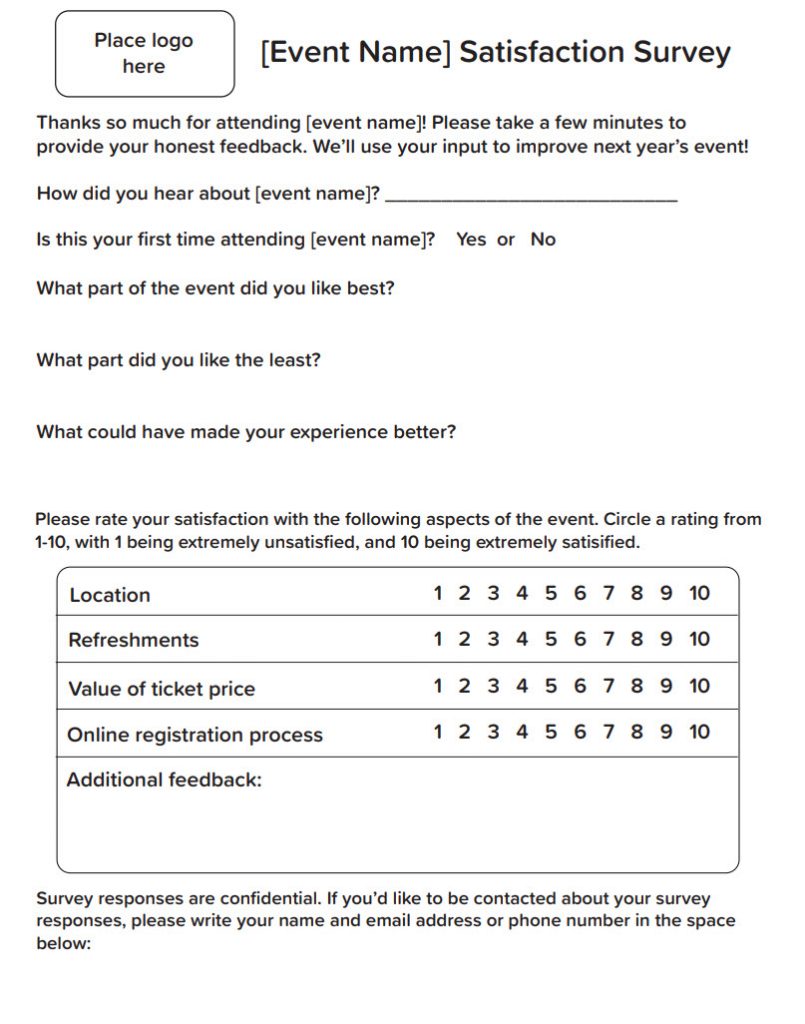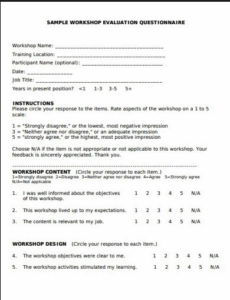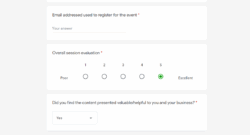After the buzz of an event fades, what truly remains is the lingering impression it left on your attendees. Understanding this impression is not just good practice; it is absolutely vital for future success. This is where a well-designed feedback mechanism comes into play, providing invaluable insights directly from those who experienced your event firsthand. By systematically gathering opinions, you can pinpoint strengths, identify areas for improvement, and ultimately ensure that every subsequent event surpasses expectations.

Imagine the power of knowing what truly resonated with your audience, whether it was the engaging speaker, the seamless registration process, or perhaps the quality of the networking opportunities. Conversely, uncovering areas where things fell short, such as inconvenient timing or a less-than-ideal venue, allows you to make informed adjustments. A comprehensive survey offers a structured way to collect this critical information, transforming subjective experiences into actionable data that drives progress and enhances future attendee satisfaction.
The Indispensable Value of Gathering Post-Event Insights
Collecting feedback after an event is far more than a mere formality; it is a fundamental pillar of continuous improvement and strategic planning. Without a clear understanding of what worked and what did not, you are essentially operating in the dark, unable to replicate successes or rectify shortcomings. Each event, regardless of its scale, represents a significant investment of time, resources, and effort. Maximizing the return on that investment hinges on learning from every experience.
By delving into attendee feedback, you gain a panoramic view of your event’s performance. Did the content meet expectations? Was the networking valuable? Were the logistics smooth? These questions, when answered honestly by your audience, provide a treasure trove of qualitative and quantitative data. This data empowers you to justify future budgets, demonstrate value to stakeholders, and fine-tune every aspect of your event strategy, from marketing outreach to on-site execution.
Think of feedback as a compass guiding your future endeavors. It helps you understand the true attendee journey, revealing touchpoints that delighted them and those that caused frustration. This detailed perspective is crucial for building loyalty and attracting new attendees for subsequent events. Satisfied participants are not only likely to return but also become enthusiastic advocates, spreading positive word-of-mouth that no marketing campaign can replicate.
Ultimately, a robust post-event feedback system ensures that every future event is not just good, but exceptional. It transforms guesswork into informed decision-making, allowing you to consistently elevate the attendee experience and achieve your organizational goals. This systematic approach is what differentiates truly successful event organizers from those who merely run events.
Core Components of Effective Feedback Collection
When designing your survey, consider these vital areas to cover:
- Overall Satisfaction: How happy were attendees with the event as a whole?
- Content and Speakers: Was the information relevant, engaging, and well-delivered?
- Logistics and Venue: Were registration, wayfinding, comfort, and facilities up to par?
- Networking Opportunities: Did attendees feel they connected meaningfully with others?
- Value for Money: Did the event justify its cost (if applicable)?
- Future Interests: What topics or formats would attendees like to see next?
Crafting Your Ideal Post Event Feedback Event Satisfaction Survey Template
Developing an effective survey template requires thoughtful consideration to ensure you gather the most pertinent and actionable insights. The goal is to make the process as easy and intuitive as possible for your attendees, encouraging high completion rates while still collecting comprehensive data. A well-structured template should balance quantitative questions, which provide measurable data, with qualitative questions that offer deeper, more nuanced perspectives.
Start by defining your primary objectives for the survey. Are you focusing on content quality, logistical efficiency, attendee engagement, or a combination of these? Clearly articulated goals will help you select the right types of questions and ensure that every query serves a purpose. Avoid making the survey too long or overly complex, as this can lead to survey fatigue and a drop in response rates. Each question should be clear, concise, and unambiguous, leaving no room for misinterpretation.
Consider incorporating a mix of question formats. Likert scales (e.g., “Strongly agree to Strongly disagree”) are excellent for gauging satisfaction levels across various aspects. Multiple-choice questions can help categorize responses, while open-ended questions provide invaluable qualitative data, allowing attendees to elaborate on their experiences and suggest improvements in their own words. It is often these qualitative insights that reveal the most unexpected and actionable feedback.
Finally, think about how you will distribute the survey and, crucially, how you will act on the feedback received. Sending the survey promptly after the event, while the experience is still fresh in attendees’ minds, is paramount. Utilizing email, event apps, or QR codes on exit are all effective distribution methods. Remember, collecting the data is only the first step; the true value lies in analyzing the responses, identifying trends, and implementing changes to enhance your next event.
Making these adjustments shows your attendees that their opinions matter, fostering a sense of community and commitment that will resonate long after the event concludes. This commitment to improvement is a powerful statement.
The journey of continuous improvement is an ongoing one, and effective feedback collection forms its very backbone. By consistently seeking input from your attendees, you are not just measuring success but actively building towards it, ensuring that each event you host becomes progressively better, more engaging, and more impactful.
Embrace the power of these insights to transform your future events from good to truly great. The knowledge gained from direct participant experiences is an invaluable asset, paving the way for stronger engagement, enhanced satisfaction, and ultimately, a reputation for delivering exceptional experiences every single time.



